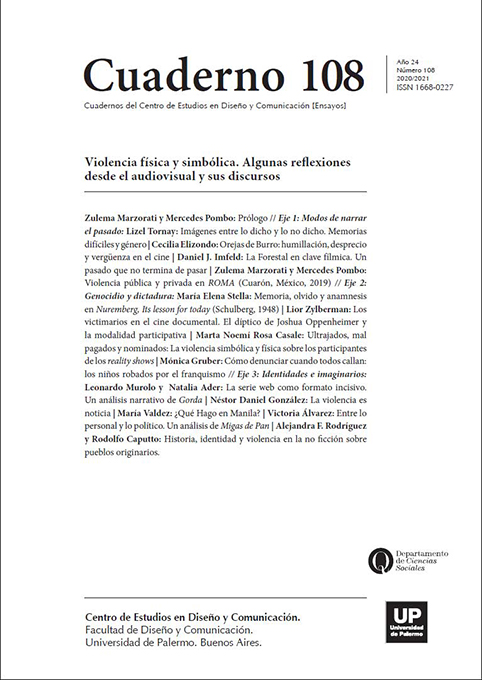Cómo denunciar cuando todos callan: los niños robados por el franquismo
Abstract
Francisco Franco's long dictatorship far from easing the pain caused by the Spanish Civil War, only increased the ache of the wounds. The country, which had faced a fratricidal conflict between 1936 and 1939, would continue to endure violence and intolerance that would become the quintessence of the winning regime. Communists were demonized and, as such, they would be treated later by the Francoist authorities. Laws enacted during the Second Republic were abolished. In this way, divorces were annulled and the rights granted to women, abolished. Both sexes inmates filled the prisons: overcrowding, diseases and a cruel treatment for the reds became a priority for the Generalísimo and his followers. Violence was crystallized as another component of prison life. On the other hand, women were humiliated, subjected to excessive punishments and executed after trials in which their rights were not respected, and they suffered the worst of the torments: the expropriation of their children. The children were separated from their parents to “demarxitize them”, this is why many were removed from their biological families and given to regime related families, and many times, after exchanging money. With the death of Franco, in 1975, many Spaniards sheltered the idea of carrying out trials that would repair wounds. However, the laws once again ignored ignominy. Oblivion and silence seemed to win the battle. More than 30,000 children were "abducted." But the culprits were never judged or punished. With this work, we aim to analyze the representation of those children, whose family life was taken from them, based on the documentaries Los niños perdidos del franquismo (2002), by Montserrat Armengou and Ricard Belis and El silencio de otros (2018), by Almudena Carracedo and Robert Behar. Parting from them, the hidden forms of violence in Francoism methods and the replication of violence due to the Silence policy and prohibition established by the laws sanctioned in democracy, would be exposed.Dictatorship – audiovisual representation – children - memory
References
Bauzá, H. F. (2015). Sortilegios de la memoria y el olvido. Bs. As.: Akal.
Ferro, M. (1995). Historia contemporánea y cine. Barcelona: Ariel.
Folguera Crespo P. (1997). El franquismo. El retorno a la vida privada (1939 – 1975). pp. 527-548. En Garrido, E. (ed.). Historia de las mujeres en España. Madrid: Síntesis.
González Duro, F. (2012). Las rapadas. El franquismo contra la mujer. Madrid: Siglo XXI.
Gruber, M. Cora, G. (2015). La imagen del “Generalísimo” y las ruinas como testimonio. El cine del 1er.
Franquismo (1939-1945). Trabajo presentado en XV Jornadas Interescuelas/ Departamentos de Historia, Universidad Nacional de la Patagonia San Juan Bosco, Comodoro Rivadavia, Chubut, 16 al 18 de septiembre de 2015.
Gusmán, L. (2005). Epitafios. El derecho a la muerte escrita. Bs. As.: Norma.
Huyssen, A. (2009). Prólogo. Medios y memoria. En Feld, C., Sittes Mor, J. (Comp.). El pasado que miramos. Memoria e imagen ante la historia reciente. Bs. As.: Paidós.
Jelin, E. (2002). Los trabajos de la memoria. Madrid: Siglo XXI.
Marzorati, Z., Pombo, M. (Comp.) (2018). Cine e Historia. Pluralidad de voces y miradas sobre el autoritarismo. Cuadernos del Centro de Estudios en Diseño y Comunicación [Ensayos], 18 (68). Pp. 11-18 Bs. As: Universidad de Palermo.
Maqua, J. (1992). El docudrama. Fronteras de la ficción. Madrid: Cátedra. Ficha Técnica: Los niños perdidos del franquismo (Els nens perduts del franquisme, 2002) Dirección: Montse Armengou y Ricard Belis / Asesor histórico: Ricard Vinyes / Producción: Muntsa Tarrés /Documentación: Maribel Serra Investigación: Mireia Pigrau /Imagen: Walter Ojeda /Montaje: Maria Josep
Tubell El silencio de otros (2018) Dirección y guion: Almudena Carracedo, Robert Bahar / Música: Leonardo Heiblum, Jacobo Lieberman / Fotografía: Almudena Carracedo/ Producción: Coproducción EspañaEstados Unidos-Francia-Canadá; Semilla Verde Productions / Lucernam Films / American Documentary POV / Independent Television Service / Latino Public Broadcasting (LPB) / El Deseo
Los autores/as que publiquen en esta revista ceden los derechos de autor y de publicación a "Cuadernos del Centro de Estudios de Diseño y Comunicación", Aceptando el registro de su trabajo bajo una licencia de atribución de Creative Commons, que permite a terceros utilizar lo publicado siempre que de el crédito pertinente a los autores y a esta revista.


